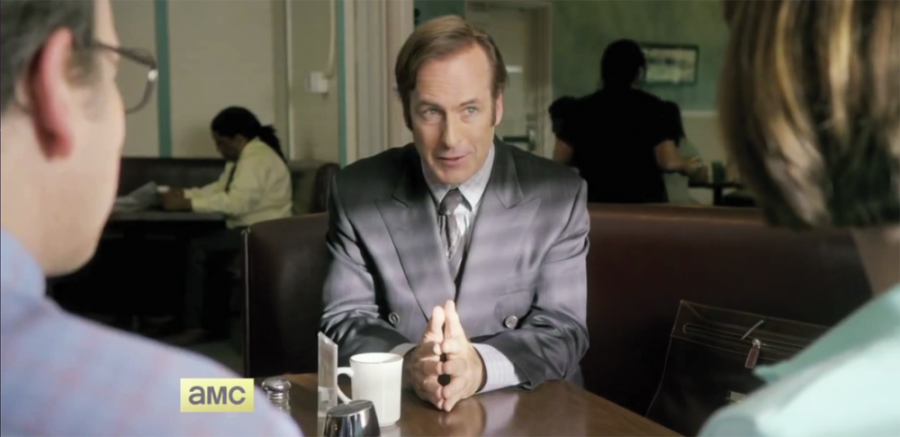Vince Gilligan is a brave man. Gilligan is responsible for creating the iconic “Breaking Bad,” which has since been regarded as one of the greatest television shows of all time. With the bar set at “all-time great,” it takes a lot of guts to plunge back into the same universe as “Breaking Bad,” which is exactly what Gilligan does with “Better Call Saul”.
He then handicapped himself by making the spiritual successor to “Breaking Bad” a prequel. Think back on the all-time great prequels. That list doesn’t exist, because prequels prove to be among the trickiest beasts in the entertainment world. Despite these potential limitations, the first season of “Better Call Saul” meets the lofty expectations it was born into.
The very first scene answers the question on everyone’s mind: How will “Better Call Saul” handle its “Breaking Bad” lineage? The show opens on a black-and-white tinted Cinnabon managed by the exiled Saul Goodman (Bob Odenkirk), in reference to Saul’s proclamation in the final season that he would be lucky to be managing a Cinnabon in Omaha, Neb., after the impending time bomb of Walter White’s life went off.
The shadow of “Breaking Bad” eternally looms, but the show treats it like a blessing rather than a curse. By opening a prequel with a flash-forward, Gilligan pulls out a trick from “Breaking Bad”: Show us the destination, and then take us along for the subsequent journey. “Better Call Saul” will eventually find its way to that Cinnabon, but not before the journey of James McGill has concluded.
The first season of “Better Call Saul” follows the adventures of Jimmy McGill, the man who will eventually be known as Saul Goodman. Jimmy is still the showman with a mouth that can talk him into (and out of) trouble at every turn. Where “Better Call Saul” breaks from the mold of “Breaking Bad” is in the trajectory of character arc. “Breaking Bad” told the story of a good man, Walter White, and his descent into becoming the monster known as Heisenberg.
“Better Call Saul” does not focus on the degradation of a good man, but instead the conflicted nature of a con man. The difference between Walter White and Jimmy McGill is in the loyalty of the viewer to their character. The crux of “Breaking Bad” was finding the point at which the viewer stopped rooting for White, and instead began hoping for his demise. Jimmy has the unwavering support of the fans, but the fact that other characters question his inherent goodness provides much of the drama in “Better Call Saul.”
“Better Call Saul” starts with Jimmy on the moral upswing, as he tries to walk the straight and narrow away from his morally questionable past as the con man Slippin’ Jimmy. Each episode is a challenge to Jimmy to find solutions to his problems without falling back into his old morally questionable ways. Jimmy constantly asks, “In the end, will being a good guy actually pay off? Or is the profit in the grey areas of life?”
Of course, not all characters struggle with moral dilemmas.
Fan favorite Mike Ehrmantraut (Jonathan Banks) returns as everyone’s favorite cantankerous tough guy. Mike works as the parking attendant at city court, where he frequently battles with Jimmy over parking validation. Even in this microcosm, their moral worldviews are revealed. Mike believes everyone must follow the agreed upon terms: five parking stamps for full validation. Jimmy makes his case for why he’s short one sticker, but Mike refuses to budge.
In the penultimate episode, Mike explains his views on the nature of humans to an associate after a drug deal: “I’ve known good criminals and bad cops, bad priests, honorable thieves — you can be on one side of the law or the other, but if you make a deal with somebody, you keep your word.”
Mike’s backstory as an honorable criminal are later recounted in the best episode of the season, “Five-O.”
The final scene of the inaugural season once again highlights the moral worldview of Mike and Jimmy as they reflect on their handling of a “misplaced” $1.2 million. Mike fulfilled his end of the deal delivering the money to its rightful owner with zero qualms. However, Jimmy laments not taking the money while he had the chance, and prophetically states, “I know what stopped me, and it’s never stopping me again.”
Gilligan must be an acrobat, because “Better Call Saul” managed to walk the dual tightropes of a “Breaking Bad” legacy and the difficulty of the prequel format. The show works both for the viewer that never got around to Netflix-ing “Breaking Bad,” as well as the mega fans desperate for more “Breaking Bad” vibes. The finale coasted “Better Call Saul” into the garage, waiting to be retooled bigger and better than ever.
The first season lived up to expectations, and has set the groundwork for an even better season two.
_______________
Follow Alex Furrier on Twitter.









